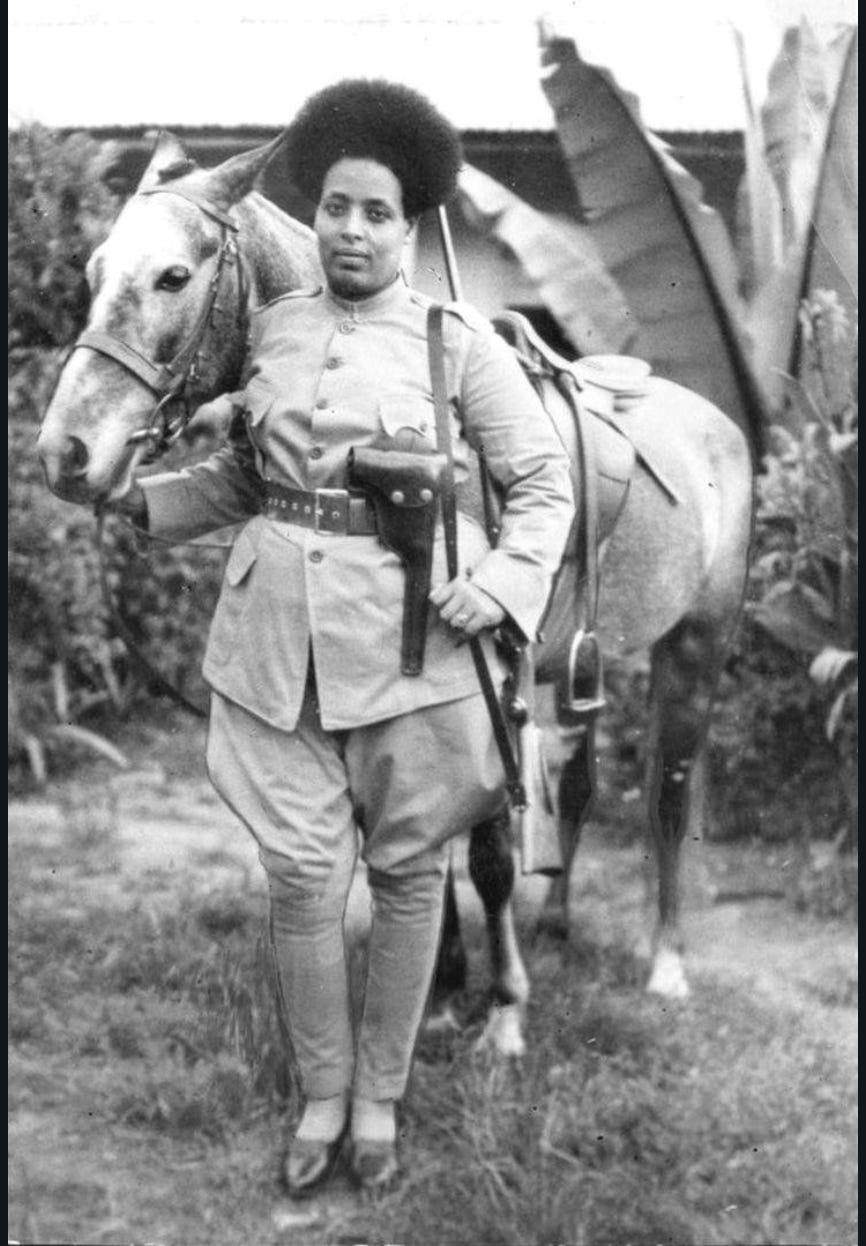Log-in information for tonight’s live chat at 8-9ET will be sent to subscribers at 5pmET. Log-in info for Friday’s chat will be sent on Friday morning, as usual. I look forward to seeing you at either or both of these events.
I am pleased to bring you this interview with the writer Maaza Mengiste, whose latest novel, The Shadow King, was shortlisted for the 2020 Booker Prize, a recipient of the American Academy of Arts & Letters Award in Literature, and a LA Times Books Prize finalist. It was named a Best Book of 2019 by the New York Times, NPR, and other publications. Beneath the Lion's Gaze, her debut, was selected by the Guardian as one of the 10 best contemporary African books. This interview, recorded on April 15, 2021, has been edited for clarity and flow.
Ruth Ben-Ghiat (RBG): Your novel is set during the Italian occupation of Ethiopia (1935-1941) and centers on Ethiopian women, especially female resistance fighters. I imagine that for many readers your novel is also an introduction to a little-known chapter of history.
Maaza Mengiste (MM): I knew that Americans didn't know about this, but I wanted to write the book because for a novelist, it's a really good story, a David and Goliath story, and it was also part of my own family history. I wanted to put this down on paper as an act of remembrance and as an act of acknowledgement. And just for the sheer storytelling joy of it.
RBG: Your novel engages with what we remember, but also how we remember, how history is remembered through images, and whose images become part of the historical record.
MM: While I did my research, using photographs, I thought about what Italians meant to capture when they were taking images of East Africans. These photographs were carefully curated memories that Italian soldiers could carry home with them, and they shaped the way that Italians later spoke about the occupation.
I wanted to insert another voice into the conversation: what might the east African person who is standing in the photograph say about that moment? What might they know about the changes that have happened in that community, in that village, in that town that this photographer doesn't understand?
RBG: There's also a theme in your novel about the tension between what we're willing to remember and what we don't want to say to ourselves. It's the tension between what will be said and enter into the historical record and what can't really be spoken about because it's too uncomfortable.
MM: The stories I had been told by Ethiopians were only stories of courage and defiance and determination and not about the real havoc and chaos that war brings. And there were no stories of what women actually experienced. There was no real explanation of how so many children who are half Italian and half Ethiopian were born in the country during the occupation. Those things were left aside in order to convey an image of Ethiopia, that in some ways equals the image that Italians have maintained of themselves during the war. No one spoke of collaboration, no one spoke of ethnic tensions, no one spoke of the fact that people would rather have Haile Selassie gone and the Italians in rather than be ruled by a monarchy again.
RBG: These nationalist historiographies occur in many post-colonial situations. There's also the problem of the former occupier trying to sanitize history. The Italians' need to protect a certain narrative about Italian colonialism led to restrictive archival policies that obscured many subjects, including the massacres and other violence against Ethiopians by Italians. I thought of all of that when your protagonist, Hirut, opens a box of old photographs of the Italian occupation period, and you write movingly that "the dead pulse beneath the lid."
MM: Memory is a main character in this book. Events move linearly, but the past constantly comes up, and voices of the dead constantly interject themselves into the present moment. The scene you mention is in the prologue of the novel, which begins in 1974. She opens the box and unleashes the past, and that is an acknowledgement of the "now-ness" of memory.
RBG: In that vein, I want to ask you about Project 3541. It's an archive of photographs and stories shared by individuals whose families were in Ethiopia during the occupation. On the website it's described as a communal effort to give an intimate perspective on an African conflict with global consequences.
MM: It's truly a labor of love. It's a combination of years of collecting images, looking at them and trying to make sense of the history. Every month the newsletter has a different theme. In March, in honor of International Women's Month, we featured women who fought in this war. It's a way people can understand this history and hopefully share their own histories with us.
RBG: In a way you're trying to create a crowdsourced archive. There are Italian archives with vast stores of images, like the Istituto Luce, but those are photos by the occupiers of Ethiopia, taken by people serving a Fascist regime. And on the Ethiopian side, for various reasons, there isn't a centralized image archive, and it can be difficult to have access to certain collections there too.
MM: I've also been surprised by the number of people who say that they have stories to share-- some people didn't have cameras back then. We have a page on the website called Memories Without Faces for those family stories, including grandfathers from Kenya or India who were in Ethiopia with the British forces. It's becoming more global than I had anticipated.
RBG: Yes, the use of colonial forces in World War Two remains too little documented, especially at the visual level. This brings me back to the global nature of the response to the Ethiopian war. The majority-White Spanish Civil War, fought in Europe, has overshadowed the Italian-Ethiopian war, fought in the horn of Africa. Allowing Mussolini to invade and occupy was the first appeasement. Munich and Hitler came three years later.
MM: This is what makes research so exciting, when you find these threads and start noticing that it all projects much further than you had imagined. As with the connections of African-Americans who volunteered and fundraised for Ethiopia with anti-Fascist and anti-racist movements in the United States and around the world. We haven't talked enough about that either.






That is a very important point that the Italo-Ethiopian war has been overshadowed by the Spanish Civil War therefore obscuring the role that race and colonialism played in fascism. The earlier point that Mayor Fiorello LaGuardia, considered a liberal at the time, energetically supported the Italian government is quite sobering. I look forward to reading Mengiste’s book and glad that more visibility is being brought to the issue.
I hope the interview continues with the part she ends with. Thank you!